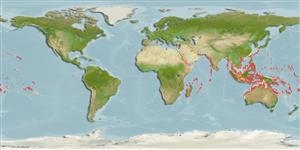Common names from other countries
分類 / Names
俗名 | 同種異名 | Catalog of Fishes(屬, 種) | ITIS | CoL | WoRMS | Cloffa
Environment: milieu / climate zone / depth range / distribution range
生態學
海洋 礁區魚類; 深度上下限 0 - 30 m (Ref. 4319), usually 6 - ? m (Ref. 37816). 熱帶; 33°N - 31°S, 30°E - 130°W (Ref. 5222)
Indo-West Pacific: none have been taken on the African coast, except for the specimen recorded by Randall and Heemstra 1991(Ref. 4787) from Kenyan coast north of Kilifi Creek. It is an insular species found in most tropical Indo-Pacific islands. Absent in the Red Sea and Persian Gulf.
印度-西太平洋: 沒有曾經採自非洲海岸, 除了從 Kilifi 小溪肯亞海岸北方被記錄 Randall 與 Heemstra 1991(參考文獻 4787) 的標本。 它是被發現於大多數的熱帶印度-太平洋的島的一個島嶼魚種。 不存在於紅海與波斯灣。
Length at first maturity / 大小 / 重量 / 年齡
Maturity: Lm 19.0 range ? - ? cm
Max length : 27.5 cm TL 雄魚/尚未辨別雌雄; (Ref. 48600)
背棘 (總數) : 11; 背的軟條 (總數) : 15 - 17; 臀棘: 3; 臀鰭軟條: 8. This species is distinguished by the following characters: body depth 2.8-3.5 in SL (10-17 cm SL individuals); head length 2.5-2.6 in SL; preopercle rounded, ventral serrae slightly enlarged; upper edge of operculum convex; midlateral part of lower jaw with 3-5 rows of teeth; gill rakers of first gill arch 7-9 + 17-19; dorsal spines 5th-9th subequal (2.5-2.8 in HL); second anal spine 2.1-2.5 in HL, distinctly longer than third spine or depth of peduncle; caudal fin rounded; pectoral-fin rays 17-19, fin length 1.6-1.9 in HL; pelvic fins 1.8-2.1 in HL; lateral-line scales 61-70; lateral scale series 93 to 114. Colour: head and body covered with polygonal (mostly hexagonal) brown spots that tend to merge, leaving only conspicuous triangular white dots at corners of the polygons; dark spots on belly and ventral part of head more rounded and separated, and often reddish brown; 4 or 5 brownish black saddle blotches (formed by groups of darker spots) on dorsal part of body and caudal peduncle, the first 4 extending onto base of dorsal fin; irregular dark bar, formed by darker polygonal spots, on lower part of body below each saddle blotch; large brown or olive spot just behind eye, often joined to similar spot on opercle; fins with close-set dark brown or reddish brown spots and white dots, except distal half of pectoral fins with faint dark spots and no white dots; pelvic and anal fins with pale edge and dark brown submarginal band; interspinous dorsal-fin membranes with dark brown triangle and short white or pale yellow filament behind tip of each spine (Ref. 39231, 90102).
小的但是在垂直的鰭與所有的身體的褐色六角形的角落上的顯著的三角形的白色斑點除腹面; 四到六個黑色斑塊沿著背鰭基底。 (參考文獻 37816)
Common in exposed outer-reef areas in relatively shallow water. Well-camouflaged grouper, solitary (Ref 37816). Feeds mainly on fishes and crustaceans (stomatopods and brachyuran crabs) (Ref. 5222). This fish is too small to be of commercial importance except as a food fish in artisanal fisheries. It is caught with hook-and-line, traps, spear, and gill nets (Ref. 39231).
在相當淺的水常見於裸露的外圍礁石區域。 善於偽裝鱸科魚類,獨居性 (參考文獻 37816). 主要吃魚與甲殼動物 (口足目甲殼類與十足目螃蟹) 。 (參考文獻 5222)
Life cycle and mating behavior
Maturities | 繁殖 | Spawnings | Egg(s) | Fecundities | 仔魚
印度-西太平洋: 沒有曾經採自非洲海岸, 除了從 Kilifi 小溪肯亞海岸北方被記錄 Randall 與 Heemstra 1991(參考文獻 4787) 的標本。 它是被發現於大多數的熱帶印度-太平洋的島的一個島嶼魚種。 不存在於紅海與波斯灣。
Heemstra, P.C. and J.E. Randall, 1993. FAO Species Catalogue. Vol. 16. Groupers of the world (family Serranidae, subfamily Epinephelinae). An annotated and illustrated catalogue of the grouper, rockcod, hind, coral grouper and lyretail species known to date. Rome: FAO. FAO Fish. Synop. 125(16):382 p. (Ref. 5222)
CITES (Ref. 128078)
Not Evaluated
人類使用
漁業: 低經濟; 游釣魚種: 是的
工具
特別的報告
下載 XML
網路資源
Estimates based on models
Preferred temperature (Ref.
115969): 25.1 - 29.3, mean 28.4 (based on 2803 cells).
Phylogenetic diversity index (Ref.
82804): PD
50 = 0.5000 [Uniqueness, from 0.5 = low to 2.0 = high].
Bayesian length-weight: a=0.00955 (0.00538 - 0.01694), b=3.00 (2.85 - 3.15), in cm Total Length, based on LWR estimates for this species & Genus-body shape (Ref.
93245).
營養階層 (Ref.
69278): 4.1 ±0.67 se; based on food items.
回復力 (Ref.
120179): 高度, 族群倍增時間少於 15個月 (K=0.9).
Fishing Vulnerability (Ref.
59153): Low vulnerability (17 of 100).
